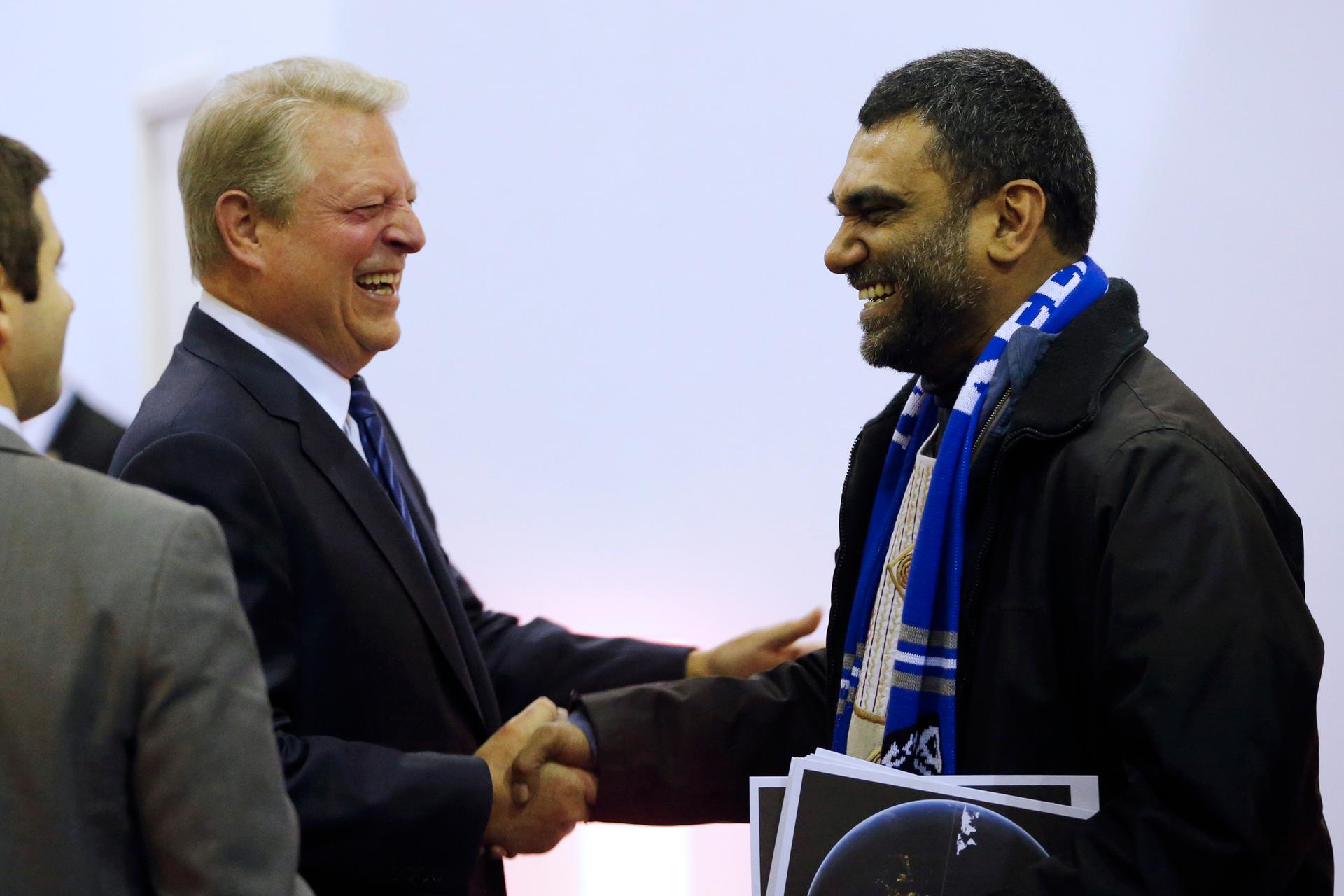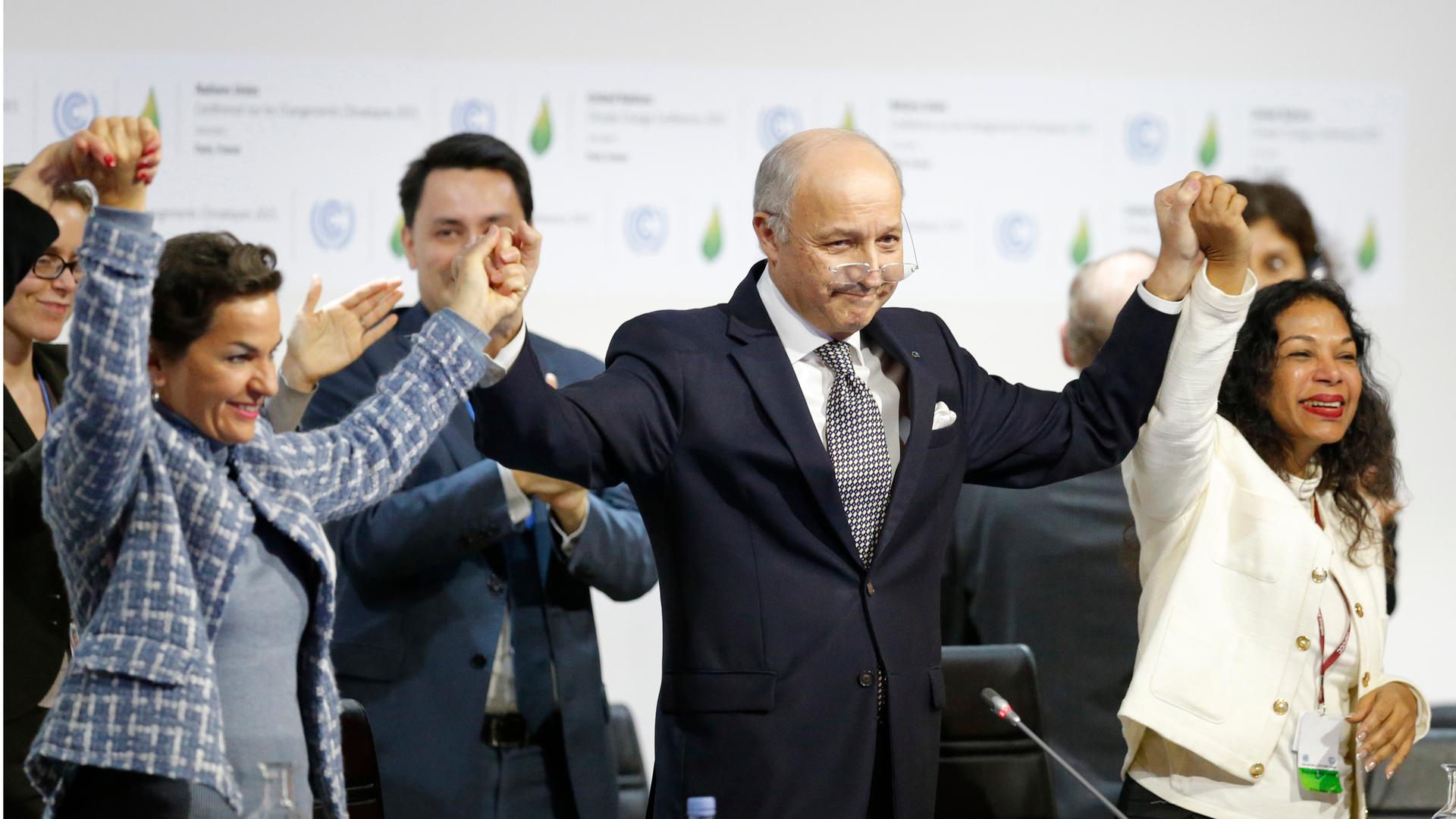The Paris climate deal won’t save the world, but it does give us a chance
French Foreign Minister Laurent Fabius (C), president-designate of the UN climate summit, and Christiana Figueres (L), executive secretary of the UN Framework Convention on Climate Change, celebrate during the final session of the World Climate Change Conference 2015 (COP21) outside Paris on December 12. The meeting produced a flawed but landmark agreement to fight climate change.
Bill McKibben is never one to praise official goings-on. But as the latest marathon UN climate talks closed with the most substantial global agreement ever on fighting climate change, even he could barely contain himself.
“This agreement won’t save the planet,” McKibben tweeted late Saturday. “(But) it may have saved the chance to save the planet (if we all fight like hell in the years ahead).”
That even McKibben, the dour éminence grise of the global grassroots climate movement, saw real value in the new UN “Paris Agreement” on climate change drives home the significance of what happened here at the latest UN climate summit in Paris the past two weeks.
After decades of gridlock and finger-pointing, 195 countries entered the room, laid down their national demands, listened to each other, took the warnings of scientists seriously, worked through the last three nights and ultimately emerged with a document whose lowest common denominator was far higher than many ever expected, and certainly far higher than anything that’s come before.
Previous hard lines melted away and many current concerns were put aside. China did not stand in the way. India did not stand in the way. The United States did not stand in the way.
“History is here,” said French President Francios Hollande before the final text was gaveled through on Saturday evening, more than 24 hours after the official conference deadline.
Follow all of our coverage of the Paris talks and the global climate crisis
We are decades from knowing what sort of history it will turn out to be — a real turning point or a tiny squiggle on the way to catastrophe. But the very fact of the agreement, and many of its themes, if not its specifics, are a huge departure from the past.
The document acknowledges that “climate change represents an urgent and potentially irreversible threat to human societies and the planet.”
It sets a goal of holding the rise in global temperatures from pre-industrial levels to “well below” 2 degrees Celsius (3.6 degrees Fahrenheit) — the outside limit of what many scientists say the planet’s climate system can handle without catastrophic global impacts — “while pursuing efforts to limit the temperature increase to 1.5°C,” a level at which scientists say the damage will still be significant but more limited (the world already passed the 1°C mark just this year).
It recognizes the responsibility of all countries, subnational authorities, civil society, the private sector, financial institutions and all other stakeholders — essentially everyone in the world with the power to do so — to take action, but — crucially — each according to their own “differentiated responsibilities … capabilities (and) national circumstances.”
It calls on all countries to set firm goals for cutting carbon pollution and revisit those goals every five years with the intention of strengthening them as emerging science dictates and developing technology and economics allow, and it establishes a common mechanism for reporting and reviewing progress on meeting those goals.
It seeks to reach zero net emissions of global greenhouse gas pollution by the second half of this century.
And it commits wealthier countries to deliver more than $100 billion a year to poorer countries to help cut emissions and deal with the impacts of climate change.
For many people who’ve worked for years on the science and politics of climate change, and the technology and economics of addressing the crisis, the agreement was a breakthrough.
“As a climate scientist,” Katharine Hayhoe of Texas Tech posted on Facebook, “this is like the best Merry Christmas, Happy Hanukkah and Your (National Science Foundation) Grant Was Funded Without Revisions all rolled into one big package with fancy French wrapping, ever.”
Nicholas Stern, a British economist and author of an influential review of the economics of climate change, called it “a turning point (that) creates enormous opportunities as countries begin to accelerate along the path toward low-carbon economic development and growth.”
Even Kumi Naidoo, the South African activist who heads Greenpeace International and strong critic of the UN process and the wealthy countries that dominate it, struck a hopeful tone.
“The wheel of climate action turns slowly but in Paris it has turned,” Naidoo said, and added — echoing McKibben — “this deal itself won’t dig us out of the hole we are in, but it makes the sides much less steep.”

But the praise was far from universal, and there are big holes in the agreement.
Perhaps the biggest is that there’s no specific means for reaching its targets for capping warming. Countries are left to come up with their own means for cutting emissions, and pledges made so far come nowhere near meeting the 2 degree challenge, much less 1.5.
“Estimates suggest that current pledges will result in a 2.7 and 3.7 degrees (Celsius) temperature increase,” said Steffen Kallbekken, of the Center for International Climate and Environmental Research — Oslo.
Perhaps as evidence of the difficulty of achieving consensus on how to meet those temperature targets, the 31-page document does not mention fossil fuels, which are at the core of the problem.
It barely mentions energy at all, even though achieving its goals will require nothing less than a global energy revolution.
It does not actually require countries to meet their national emissions targets — a major concession to the US, which almost certainly would not have been able to get such a requirement through the Senate.
And while it calls for big transfers of funds from rich to poor countries to aid the transition, the document is short on specifics and expressly avoids making the countries that largely caused the problem legally liable for damages or compensation.
There is also no mention of a “carbon budget” — the idea that only a certain amount of carbon can still be emitted, and so only a certain amount of fossil fuels can still be burned, to avoid overshooting the temperature targets — and so no mention of who should get to use those remaining resources. Poorer countries such as India have argued that they should get the lion’s share of that remaining budget, since rich countries have used up most of it already.
“There’s not enough in this deal for the nations and the peoples on the front lines of climate change,” Greenpeace’s Naidoo said. “The nations that caused the problem have promised too little help to the people who are already losing their lives and livelihoods.”
Asad Rehman, of Friends of the Earth International, put it more harshly.
“We can say that the iceberg has been struck, the ship is going down, and the band is still playing to the warm applause of our political leaders,” Rehman said. “But even more damaging is that the poor are being denied a place in the lifeboats.”
In a statement, Rehman’s organization denounced the Paris agreement as “a sham.”
Even those who praised the agreement were quick to point out that the real work has just begun.
“This agreement is a turning point for a world transformation,” said Johan Rockström of the Stockholm Resilience Centre. But Rockström also told reporters that “to stand any chance to stay within a 1.5 degree Celsius future … countries in Europe, in North America, Australia, the whole OECD bloc, need to be zero fossil fuel use at 2030 … So basically we need to shut down the light Monday morning after (this meeting) to stand a high degree of chance to be able to have that transition.”
And that, many here say, is the crux of the challenge but also the bottom line of the agreement. Between the hundreds of lines of diplomatic language, couched terminology and untouched hot buttons, is a message to the global business community: we are ushering in the end of the fossil fuel economy.
[[{“fid”:”94885″,”view_mode”:”original_image”,”type”:”media”,”link_text”:null,”field_deltas”:{},”attributes”:{“alt”:”Children of AVAAZ NGO activist group hold letters reading \”farewell fossil fuels” as they demontrate at the entrance of the venue for the World Climate Change Conference 2015.”,”title”:”Children of AVAAZ NGO activist group hold letters reading \”farewell fossil fuels” as they demontrate at the entrance of the venue for the World Climate Change Conference 2015.”,”height”:498,”width”:900,”class”:”media-element file-original-image”,”data-delta”:”2″},”fields”:{}}]]
“Although different countries will move at different speeds, the transition to a low carbon world is now inevitable,” said Mohamed Adow of Christian Aid. “Governments, investors and businesses must ride this wave or be swept away by it.”
Many businesses and entire industries will no doubt resist that wave. But most of the hundreds represented at the Paris summit were relieved by what they called the strong signal it sent to global markets.
“Microsoft stands with the many voices within the private and public sectors” at the summit, said the tech giant’s Rob Bernard. Bernard said the agreement will “provide the certainty required for corporations around the world to accelerate their low-carbon investments and foster the creation of a true low-carbon global economy.”
To get there will require massive shifts in investment in and deployment of green technologies, breakthroughs in efficiency in the generation and use of clean energy, and very likely development of technologies that don’t even exist yet. And nothing that comes out of the Paris meeting will do anything to avoid the damage to human communities and vital ecosystems that is already “locked in” due to the billions of tons of CO2 and other climate-altering pollutants already dumped into the atmosphere.
But the Paris Agreement is, as so many here put it, a turning point. The ship may already have hit the iceberg, but Paris may have bought time to patch it up and keep it from sinking.
“The job is far from done yet,” said Greenpeace’s Naidoo. “We’re not out of the hole yet. But we feel there’s enough hooks there that can help us climb out of the hole.”
Our coverage reaches millions each week, but only a small fraction of listeners contribute to sustain our program. We still need 224 more people to donate $100 or $10/monthly to unlock our $67,000 match. Will you help us get there today?
